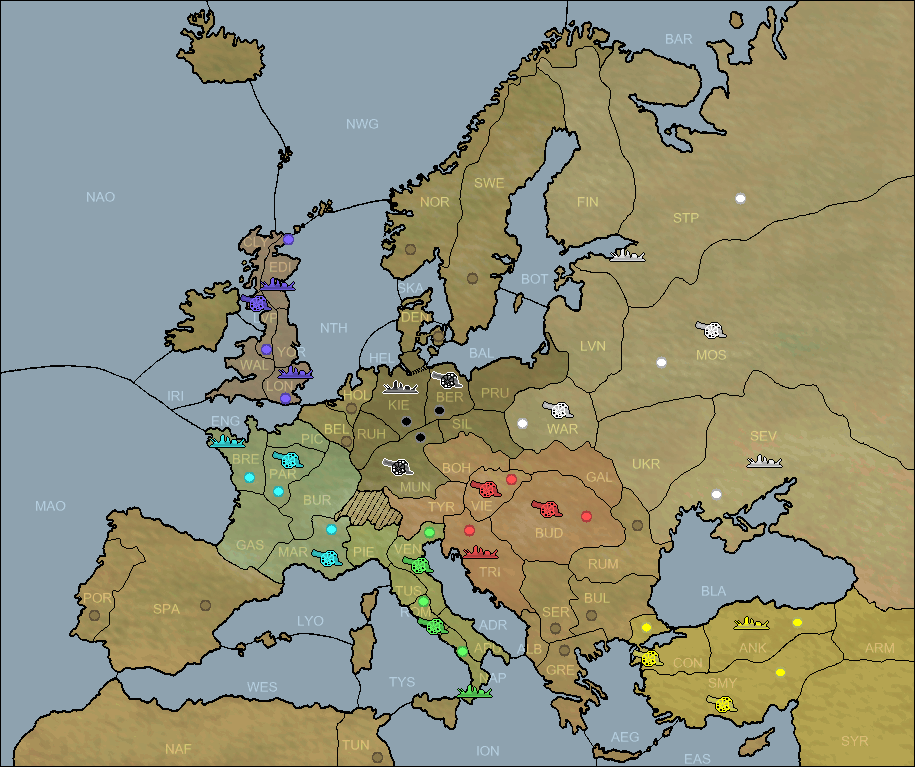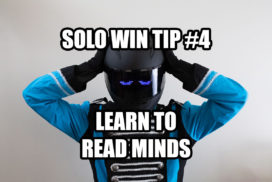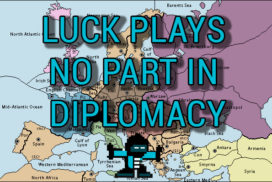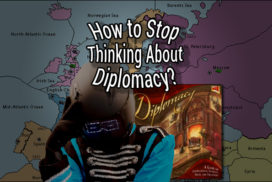
Another Gunboat Journal?
I’m a fan of BrotherBored and got drawn in reading his gunboat journal. Honestly, I didn’t initially think much of the advice. I felt like it was OK but that there are plenty of other ways to go about playing Diplomacy. Regardless, I decided to keep reading and by the end of the journal, BrotherBored had won me over. I was hooked!
Next, I read the ODC journal (which I thought was fantastic) and kept going from there (I particularly like the Charismatic Serial Killer essays – if you haven’t read them, you’re missing out!). I had stopped playing gunboat because of the crazy things players do that are maddening (hence, I prefer press Diplomacy).

After reading through BrotherBored’s blog, I decided to give gunboat another shot and try some of his techniques … and I got my first solo in a gunboat game!
I read the gunboat journal for Martin’s game and thought it was more like the typical level of competition for the games I play (I’m definitely not among the greatest gunboat players in the world!). Even though I achieved my first solo in gunboat, I still felt that something could be added to these journals and to my techniques (which I mostly took from reading BrotherBored).
I noticed that both Martin and BrotherBored changed their opinions about the players they were playing against as the game went on. It seemed to me that they sometimes forgot earlier opinions they held of other players that would have explained the later actions of those players. Considering how long these games can be, that of course makes sense. I could read about the game in days while they had weeks between the start and end of a game. It would be easy to forget about actions from earlier years in the game.

What if a journal could take this into account? Would it be useful to create a holistic view of the other players that draws past behaviors into the analysis? Let’s find out!
To do this, the journal will not focus so much on unit-by-unit predictions (although that will happen at times too). I will focus more on analysis of intentions, patterns, and strategies. This will be used to predict what other players will do at critical junctures, not necessary the best orders. I won’t make a detailed list each round, instead considering things like:
- Does the player make movements in the spring that obscures their fall objectives?
- Do they build in a way that announces their next target?
- Are only support orders utilized or do they also cut support?
- Which approach to the game (aggressive, defensive, uncertain, etc.) can be gleaned from their orders?
To paraphrase a poker axiom, the goal is to play the players, not just the game.
What Is BOUNCED?
BOUNCED (Basic Online Utility for Network Computerized Electronic Diplomacy) is an online platform for playing Diplomacy. BOUNCED was made about 20 years ago as a project by Christian Shelton when he was in grad school. I have tried BOUNCED, Backstabbr, webDiplomacy, and Play Diplomacy in my short time playing this game and I prefer BOUNCED overall.

I started playing Diplomacy a little over a year ago. I’ve always loved board games, especially ones that involve strategy. A friend invited me to play Diplomacy online with him, telling me it’s like Risk without dice and that all the moves happen at once, so the diplomacy that takes place between players is a huge factor. The game between our group was hosted on BOUNCED and I was hooked! Most of the players had never played before and I won in a solo victory. However, there were some players not entering moves at times so I don’t really consider it much of a victory.

Backstabbr seems to me that it best approximates the in-person game of Diplomacy because you can literally enter any order. Being able to point-and-click orders on the map is nice. I also really like that you get an email when you receive press[1]With Backstabbr, you can reply to press via email too. on Backstabbr and can see a full conversation (having each message separate can make it hard to find past messages at times). However, the games I played had people drop out and it was a bummer to have powers in “civil disorder.” I like the interface but not the overall community that I experienced.
For webDiplomacy, it has the largest base of players and games. However, I don’t like the fact that I don’t get an email when the phase changes. I also don’t like that the orders aren’t on the same screen as the map and that the orders that can be entered are limited (having the drop-down menu feels like I’m a child with an adult telling me which orders I can pick). On the plus side, it is relatively easy to enter the orders on a phone (no need to type them). For press, while conversations with each power are neatly organized, I don’t like the absence of small group messages. Finally, I don’t like the colors (yes, that’s a minor thing, but England being pink just seems odd to me).
Play Diplomacy is very similar to Backstabbr to me. Emails were received for press[2]With Play Diplomacy, you cannot reply to press via email. and false orders can be entered. It was also similar in that there was a high number of players dropping out (although the skill level of the players who didn’t was better than the others sites I played on).
BOUNCED has a smaller pool of players and games than it had in the past (I believe it lost a lot of players after its server crashed years ago). Like all websites, sometimes players do drop out of games. Replacement positions open and BOUNCED has a rating system that incentivizes taking a replacement position. Unlike webDiplomacy, there is no ranking penalty to take a replacement position if you lose. However, players have gamed that system in the past to get ridiculously high rankings by never joining new games and only playing as a replacement.

BOUNCED also has 12 variants and sends an email (if desired) when the phases change. Orders have to be typed in which allows for mistakes to be made. Most games have a feature that allows you to check the syntax if you want and a tool to enter sample orders to see what would happen (similar to Backstabbr’s “Sandbox” but only with text). Illegitimate orders show up as “NMR” when processed, except for orders to move to Switzerland and convoy orders. This feature makes convoy orders useful to send messages in gunboat. The press games are not abundant and take awhile to fill. The amount of press in games isn’t at the elite BrotherBored level (although it’s not too shabby either).
Each site has their pros and cons. For me, I’m sticking with BOUNCED, dipping my toe into webDiplomacy for gunboat and Play Diplomacy for press, and using Backstabbr for private games.
This Game, Quickie600
There is a long-running series of gunboat games hosted by Cal White (diplomat). I decided to join Quickie600 for this journal (the 600th game in the series). Round duration is 24 hours with an 8 hour grace period. There are no weekend deadlines. Players can move the game along if everyone sets their orders to process immediately (typically for retreats and builds). If someone goes past grace they usually get replaced right away, although sometimes they are given a little extra time if they give the GM a good reason. There is no minimum or maximum player ranking to participate, so I could be playing with players completely new to Diplomacy, the best gunboat players on BOUNCED, and anyone in-between.
You can view the game here. You don’t need a BOUNCED account. Just enter “guest” as both the username and password when prompted.
Now that you’re acquainted with this journal and the game it will based on, let’s get to it!
BOUNCED Gunboat Journal—Table of Contents
Introduction
1901 | 1902 | 1903 | 1904
1905 | 1906 | 1907
Elimination
Conclusion
End of Game Statements
